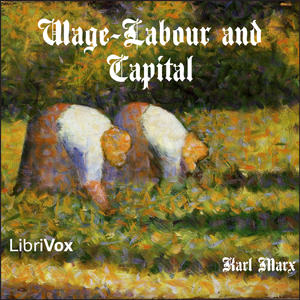Wage-Labour and Capital
Originally written as a series of newspaper articles in 1847, Wage-Labour and Capital was intended to give an overview of Marx’s central theories regarding the economic relationships between workers and capitalists. These theories outlined include the Marxian form of the Labour Theory of Value, which distinguishes “labour” from “labour-power”, and the Theory of Concentration of Capital, which states that capitalism tends towards the creation of monopolies and the disenfranchisement of the middle and working classes. These theories were later elaborated in Volume 1 of Capital, published in 1867.
This edition of Wage-Labour and Capital, published in 1891, was edited and translated by Friedrich Engels, and remains one of the most widely read of Marx’s works. (Description by Carl Manchester).
Genre(s): *Non-fiction, Political Science
Language: English
| Section | Chapter | Reader | Time |
|---|---|---|---|
| Play 00 | Introduction by Engels | Carl Manchester |
00:22:30 |
| Play 01 | Preliminary | Carl Manchester |
00:04:37 |
| Play 02 | What Are Wages? | Carl Manchester |
00:10:25 |
| Play 03 | By What is the Price of a Commodity Determined? | Carl Manchester |
00:11:30 |
| Play 04 | By What are Wages Determined? | Carl Manchester |
00:03:58 |
| Play 05 | The Nature and Growth of Capital | Carl Manchester |
00:07:25 |
| Play 06 | Relation of Wage-Labour to Capital | Carl Manchester |
00:11:32 |
| Play 07 | The General Law | Carl Manchester |
00:06:59 |
| Play 08 | The Interests of Capital and Wage-Labour | Carl Manchester |
00:09:19 |
| Play 09 | Effect of Capitalist Competition | Carl Manchester |
00:14:11 |
